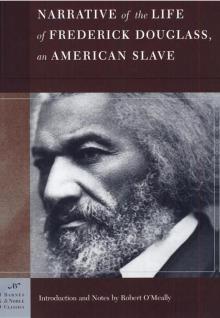- Home
- Frederick Douglass
The Negro Exodus from the Gulf States Page 3
The Negro Exodus from the Gulf States Read online
Page 3
No people can be much respected in this country, where all are eligible to office, that cannot point to any one of their class in an honorable, responsible position. In sending a few men to Congress, the negroes of the South have done much to dispel prejudice and raise themselves in the estimation of the country and the world. By staying where they are, they may be able to send abler, better and more effective representatives of their race to Congress than it was possible for them to send at first, because of their want of education and their recent liberation from bondage. In the South the negro has at least the possibility of power, in the North he has no such possibility; and it is for him to say how well he can afford to part with this possible power.
But another argument in favor of this emigration is, that having a numerical superiority in Mississippi, Louisiana and South Carolina, and thereby possessing the ability to choose some of their own number to represent them in the State and Nation, they are necessarily brought into antagonism with the white race, and invite the very political persecution of which they complain. So they are told that the best remedy for this persecution is to surrender the right and advantage given them by the Constitution and the Government of electing men of color to office. They are not to overcome prejudice and persecution where it is, but to go where it is not; not to stand where they are, and demand the full Constitutional protection which the Government is solemnly bound to give, but to go where the protection of the Government is not needed. Plainly enough, this is an evasion of a solemn obligation and duty; an attempt to climb up some other way, a half-way measure, a makeshift, a miserable substitution of expediency for right. For an egg, it gives the negro a stone.
The dissemination of this doctrine by the agents of emigration cannot but do the cause of equal rights much harm. It lets the public mind down from the high ground of a great national duty to a miserable compromise, in which wrong surrenders nothing, and right everything. The South is not to repent its crimes and submit to the Constitution, in common with all other parts of the country, but such repentance and submission is to be conveniently made unnecessary by removing the temptation to commit violations of the law and the Constitution. Men may be pardoned for refusing their assent to a measure supported upon a principle so unsound, subversive and pernicious. The Nation should be held steadily to the high and paramount principle that allegiance and protection are inseparable, that this Government is solemnly bound to protect and defend the lives and liberties of all its citizens, of whatever race or color, or of whatever political or religious opinion, and to do this in every State and Territory within the American Union.
Then, again, is there to be no stopping-place for the negro? Suppose that, by-and-by, some "Sand-lot orator" shall arise in Kansas, as in California, and take it into his head to stir up the mob against the negro, as he stirred up the mob against the Chinese? What then? Must the negro have another exodus? Does not one exodus invite another? and in advocating one, do we not sustain the demand for another?
Plainly enough, the exodus is less harmful as a measure, than are the arguments by which it is supported. The one is the result of a feeling of outrage and despair; but the other comes of cool, selfish calculation. One is the result of honest despair, and appeals powerfully to the sympathies of men; the other is an appeal to our selfishness, which shrinks from doing right because the way is difficult.
Not only is the South the best locality for the negro, on the ground of his political powers and possibilities, but it is best for him as a field of labor. He is there, as he is nowhere else, an absolute necessity. He has a monopoly of the labor market. His labor is the only labor which can successfully offer itself for sale in that market. This fact, with a little wisdom and firmness, will enable him to sell his labor there, on terms more favorable to himself than he can elsewhere. As there are no competitors or substitutes, he can demand living prices with the certainty that the demand will be complied with. Exodus would deprive him of this advantage. It would take him from a country where the landowners and planters must have his labor, or allow their fields to go untilled and their purses unsupplied with cash, to a country where the landowners are able and proud to do their own work, and do not need to hire hands, except for limited periods, at certain seasons of the year. The effect of this will be to send the negro to the towns and cities to compete with white labor. With what result, let the past tell. They will be crowded into lanes and alleys, cellars and garrets, poorly provided with the necessaries of life, and will gradually die out.
The negro, as already intimated, is pre-eminently a Southern man. He is so both in constitution and habits, in body as well as mind. He will not only take with him to the North Southern modes of labor, but Southern modes of life. The careless and improvident habits of the South cannot be set aside in a generation. If they are adhered to in the North, in the fierce winds and snows of Kansas and Nebraska, the emigration must be large to keep up their numbers.
It would appear, therefore, that neither the laws of politics, labor nor climate favor this exodus. It does not conform to the laws of healthy emigration, which proceeds not from south to north, not from heat to cold, but from east to west, and in climates to which the emigrants are more or less adapted and accustomed.
As an assertion of power by a people hitherto held in bitter contempt; as an emphatic and stinging protest against highhanded, greedy and shameless injustice to the weak and defenseless; as a means of opening the blind eyes of oppressors to their folly and peril, the exodus has done valuable service. Whether it has accomplished all of which it is capable in this particular direction, for the present, is a question which may well be considered. With a moderate degree of intelligent leadership among the laboring class at the South, properly handling the justice of their cause, and wisely using the exodus example, they can easily exact better terms for their labor than ever before. Exodus is medicine, not food; it is for disease, not health--it is not to be taken from choice, but necessity. In anything like a normal condition of things, the South is the best place for the negro. Nowhere else is there for him a promise of a happier future. Let him stay there if he can, and save both the South and himself to civilization. While, however, it may be the highest wisdom in the circumstances for the freedmen to stay where they are, no encouragement should be given to any measures of coercion to keep them there. The American people are bound, if they are or can be bound to anything, to keep the North gate of the South open to black and white, and to all the people. The time to assert a right, Webster says, is, when it is called in question. If it is attempted by force or fraud to compel the colored people to stay there, they should by all means go--go quickly, and die, if need be, in the attempt.
Thus far, and to this extent, any man may be an emigrationist; and thus far, and to this extent, I certainly am an emigrationist. In no case must the negro be "bottled up" or "caged up." He must be left free, like every other American citizen, to choose his own local habitation,
and to go where he shall like. Though it may not be for his interest to leave the South, his right and power to leave it may be the best means of making it possible for him to stay there in peace.
Woe to the oppressed and destitute of all countries and races, if the rich and powerful are to decide when and where they shall go or stay! The deserving hired man gets his wages increased when he can tell his employer that he can get better wages elsewhere. And when all hope is gone from the hearts of the laboring classes of the Old World, they can come across the sea to the New. If they could not do that, their crushed hearts would break under increasing burdens. The right to emigrate is one of the most useful and precious of all rights.
But not only to the oppressed, but to the oppressor, is the free use of this right necessary. To attempt to keep the freedmen in the South--those who are spirited enough to undertake the risks and hardships of emigration--would involve great possible danger to all concerned. Ignorant and cowardly as the negro may be, he has been known to fight bravely for his liberty. He w
ent down to Harper's Ferry with John Brown, and fought as bravely and died as nobly as any. There have been Nathaniel Turners and Denmark Veseys among them in the United States; Joseph Cinquees, Madison Washingtons and Tillmons on the sea, and Toussaint l'Ouvertures on land. Even his enemies, during the late war, had to confess that the negro is a good fighter, when once in a fight. If he runs, it is only as all men will run when they are whipped. This is no time to trifle with the rights of men. All Europe to-day is studded with the material for a wild conflagration. Every day brings us news of plots and conspiracies against oppressive power.
An able writer in the North American Review for July, himself a Nihilist, in a powerful article defends the extremest measures of his party, and shows that the treatment of the emancipated peasants by the Government and landed aristocracy of Russia is very similar to that now practiced toward the freedmen by the landed aristocracy of the South. Like causes will produce like effects the world over. It will not be wise for the Southern slave-holders and their successors to shape their policy upon the presumption that the negro's cowardice or forbearance has no limit. The fever of freedom is already in the negro's blood. He is not just what he was fourteen years ago. To forcibly dam up the stream of emigration would be a measure of extreme madness, as well as oppression. It would be exposing the heart of the oppressor to the pistol and dagger, and his home to fire and pillage. The cry of "Land and Liberty," the watchword of the Nihilistic party in Russia, has a music in it sweet to the ear of all oppressed peoples; and well shall it be for the land-holders of the South if they shall learn wisdom in time, and adopt such a course of just treatment toward the landless laborers of the South in the future as shall make this popular watchword uncontagious and unknown among them, and further stampedes to the North wholly unknown, undesirable and impossible.

 Narrative of the Life of Frederick Douglass: An American Slave
Narrative of the Life of Frederick Douglass: An American Slave My Bondage and My Freedom
My Bondage and My Freedom Two Slave Rebellions at Sea
Two Slave Rebellions at Sea The Color Line in America
The Color Line in America The Negro Exodus from the Gulf States
The Negro Exodus from the Gulf States Hog and Hominy: Soul Food From Africa to America
Hog and Hominy: Soul Food From Africa to America Narrative of the Life of Frederick Douglass
Narrative of the Life of Frederick Douglass![An Appeal to Congress for Impartial Suffrage [a machine-readable transcription] Read online](http://i1.bookreadfree.com/i/03/23/an_appeal_to_congress_for_impartial_suffrage_a_machine-readable_transcription_preview.jpg) An Appeal to Congress for Impartial Suffrage [a machine-readable transcription]
An Appeal to Congress for Impartial Suffrage [a machine-readable transcription] The Color Line
The Color Line My Bondage and My Freedom (Penguin Classics)
My Bondage and My Freedom (Penguin Classics) The Heroic Slave
The Heroic Slave